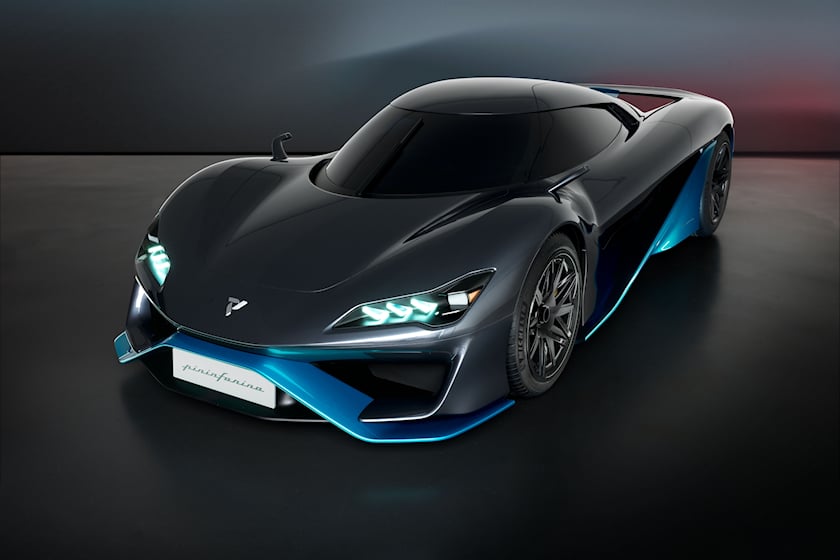The Virtech Apricale offers EV performance in a lightweight shell.
Virtech chose the Goodwood Festival of Speed to debut its Pininfarina-styled Apricale hydrogen hypercar, which can be simplified tremendously as a Toyota Mirai on steroids. The reality is vastly more complicated than that, however, as this exquisitely-styled machine is a performance tour-de-force.
While the car has a long list of impressive figures, one stands head and shoulders above the rest. Hydrogen fuel-cell cars still rely on electric motors for power, but the required electricity comes from a chemical reaction in the fuel cell and not via heavy batteries. By developing a high-performance fuel cell, Virtech produced a hypercar with a weight of just 1,000 kg. That’s just over 2,200 pounds, in case you don’t speak metric. And to push those pounds towards the horizon at a rapid pace, it has 800 kW of total deployable energy. In freedom units, it has 1,000 horsepower on tap.
To put that in perspective, the Lucid Air GT Performance produces the same sort of power as the Apricale, but weighs 5,250 lbs.
 Virtech
Virtech
 Virtech
Virtech
 Virtech
Virtech
 Virtech
Virtech
The Apricale has two drive motors – one at the front and one at the rear. Usually, a hefty EV would need torque vectoring and rear-wheel steering to make it feel agile, but thanks to this car’s curb weight, Virtech uses nothing more than a pair of old-school mechanical differentials.
Virtech claims “the unique combination of light weight and the instant response of electric motors means that the Apricale will be even more inspiring to drive than a traditional supercar.”
What we don’t know is what sort of performance to expect, as the brand makes no bold performance claims other than to say the single-ratio final drive is geared for 200+ mph.
“Hydrogen fuel cells have, until now, been used as range extenders for powertrains with batteries at their heart. We’ve essentially turned that approach on its head, developing a powertrain around multi-hundred kW fuel cell system supported by a lightweight but highly efficient battery. This delivers hypercar performance for Apricale but at less than half the weight of typical BEV hypercars,” said Matt Faulks, Viritech’s CTO.
What Virech has essentially done is prove that you can have a (relatively) guilt-free zero-emissions powertrain that provides the same range and performance as an internal combustion engine. “Not only does this reduction in weight transform Apricale’s driving dynamics, but our reduced reliance on batteries means less demand on rare earth minerals,” said Faulks. The battery he refers to is a small 6 kWh unit manufactured from extremely energy-dense lithium-ion cells. Managed by the patent-pending Tri-Volt energy management system, the battery aids power deployment under hard acceleration.
Virtech went to great lengths to ensure the Apricale has a low curb weight. Instead of using heavy hydrogen storage tanks, the Apricale used lightweight composites and a graphene-enabled resin system to incorporate the storage tanks into the monocoque. That means the tanks are essentially structural elements instead of add-ons, while still capable of holding hydrogen at 600 bar pressure. The result of this weight saving, without compromising volume, is that the Apricale is capable of driving 350 miles before refueling. And because it’s hydrogen-powered, refueling takes no longer than it does in a standard combustion-powered car.
 Virtech
Virtech
 Virtech
Virtech


Because the car weighs next to nothing, there was no need for Virtech to resort to fancy electronic systems to make the Apricale feel nimble. It feels nimble because Virtech followed Colin Chapman’s car design philosophy. The suspension features all-around pull-rod torsion bars with a limited degree of active ride control.
“Viritech is focused on becoming the world’s leading developer of hydrogen powertrain solutions, and the Apricale, with its requirement to optimize weight, space and performance, provided us the perfect development platform for our core powertrain technologies, which have also been designed for broad application in the coming age of sustainable transportation,” said Timothy Lyons, Viritech’s founder.
The Apricale’s key technologies and groundbreaking fuel cell storage solution have already been validated in two mule vehicles. A new prototype called XP1 will soon hit the streets and complete 62,000 miles. It will run alongside another production prototype that will test everything else.
Virtech plans on commencing with customer deliveries in early 2024, though no price has been set. Only 25 models will be manufactured.


